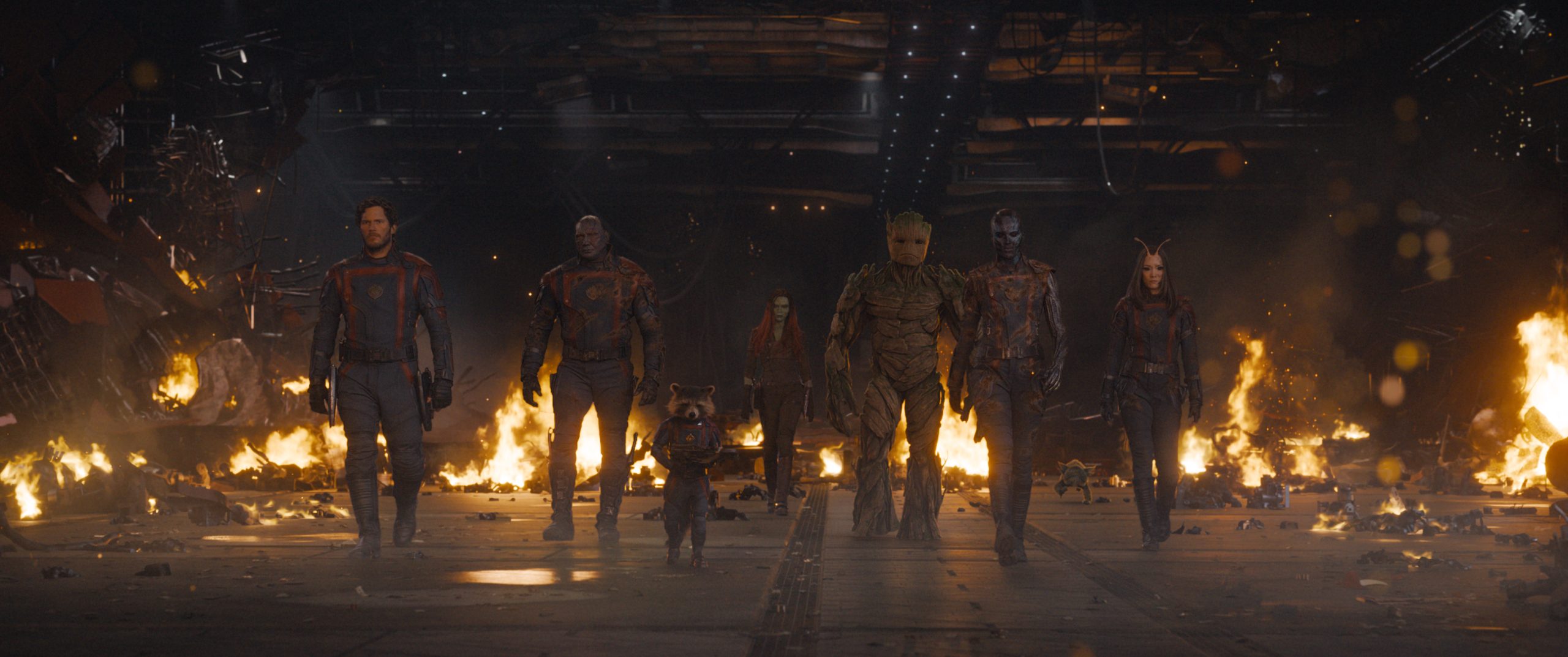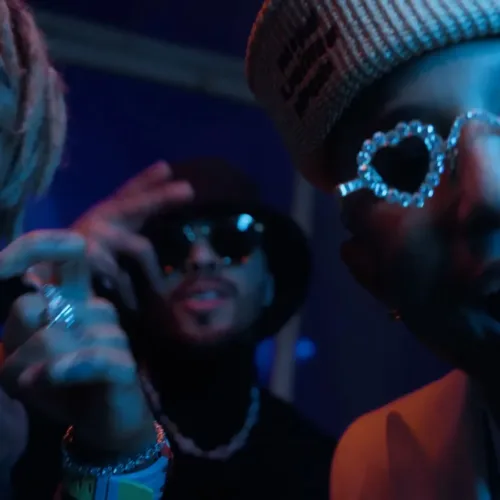Between 2006’s “Slither” and the first “Guardians of the Galaxy” movie in 2014, writer-director James Gunn carved out time to tweet some things that were, at best, ill-advised. Gunn’s occasionally grating sense of humor compelled him to hit send on some pretty dubious one-liners. Some real “this should’ve stayed in the drafts” type stuff. Nothing unforgivable, exactly, but bizarre and off-putting enough for Marvel to quickly fire Gunn as he was preparing to make the next “Guardians” film.
However, when alt-right commentator Mike Cernovich started resurfacing those tweets to get back at Gunn for unleashing a tirade of insults against then-President Donald Trump, he had no idea he was toppling the first of many dominoes, one that would eventually turn Gunn into a filmmaker powerful enough to make two multibillion dollar movie studios shamelessly bend to his will. We won’t call it a comeback, mostly because it has more in common with a real-life superhero origin story.
James Gunn is a swing-for-the-fences, go-for-broke filmmaker whose “we won’t know until we try” approach has earned him a pretty even number of detractors and devotees. You’re either on board with his antics or you’re not, and nobody can really blame you for either. However, it was Gunn’s singular, uncompromising sensibility that made him the only director in the MCU’s roster who knew how to, or was allowed to, circumvent the assembly line and spend $200 million of Kevin Feige’s money making something genuinely weird when he directed his first “Guardians” movie. Mostly because James Gunn is also one of the few filmmakers who actually knows how to write a superhero.
As with Gunn’s screenplay for “The Specials” (2000), as well as his second directorial effort, “Super” (2010), Gunn’s heroes are deeply fractured human beings in search of purpose, personhood, and redemption. They’re desperate to like who they see in the mirror and Gunn is often gracious enough to give them the opportunity, should they choose to take it. His first “Guardians of the Galaxy” (2014) is so concerned with unpacking each character’s Rosebud that it’s easy to completely disregard the massive jurisdiction promised by the title.
Related: “Did Oscar Winner Iñárritu’s ‘Bardo’ Sink Under the Weight of its Own Narcissism?”
His “Guardians” films worked because, with his characters often cruising through the deepest recesses of outer space, he had the option to keep them on the sidelines as long as the timeline between major event films like “Infinity War” and “Endgame” would allow. And in a cinematic universe that’s content to put half of the universe on the chopping block in the most nebulous and impersonal way possible, Gunn’s commitment to root causes is the final tether keeping the MCU’s red balloon from floating into oblivion. At least, it was.
As most people have already pointed out, the arrival of “Guardians of the Galaxy Vol. 3” really does signal the end of an era. Not only because James Gunn is enjoying his corner office as co-CEO of DC Studios alongside Peter Safran, but because his third and final “Guardians” is, for better or worse, the James Gunniest movie James Gunn has ever Gunned. You can practically feel him waving goodbye to fans with one hand and giving Feige a middle finger with the other.
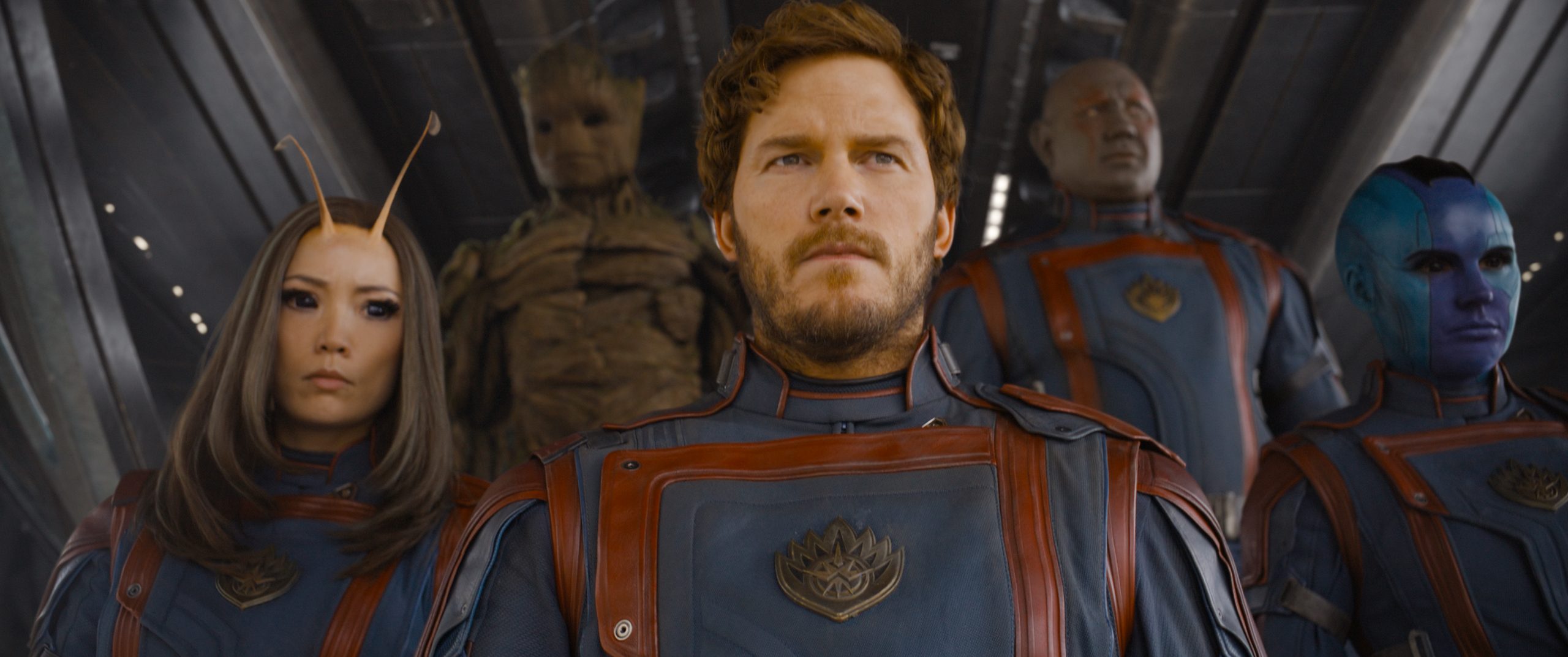
(L-R): Pom Klementieff as Mantis, Groot (voiced by Vin Diesel), Chris Pratt as Peter Quill/Star-Lord, Dave Bautista as Drax, Karen Gillan as Nebula in Marvel Studios’ Guardians of the Galaxy Vol. 3. Photo courtesy of Marvel Studios. © 2022 MARVEL.
“Vol. 3” is a movie that opens with a 4-minute, unbroken take of a CGI raccoon walking to the tune of “Creep” by Radiohead through a cavernous homebase where the reverberations of the audio change with each subsequent room. Also, it’s not just “Creep.” It’s the “Unplugged” acoustic rendition of “Creep,” which is objectively the best one. Gunn’s final “Guardians” outing has creature designs that appear to be ripped right from the pages of an unmade “Slither” sequel. It also features what is probably the most gruesome image ever to appear in a PG-13 movie. The whole film takes place over the course of maybe two days, and the villain isn’t terrifying simply because he wants to destroy the universe. Or heal it. Or restore it. Or whatever Thanos was on about. He’s terrifying because Gunn has the good sense to write a real human being with motivations instead of a physical embodiment of some intangible, existential threat.
Gunn has always pointed to Rocket Raccoon (voiced by Bradley Cooper) as his entry point into the Marvel universe, as he was drawn to Rocket’s inherent sadness, despite the character only appearing in a handful of Marvel comics. If this is the case, Gunn is fulfilling a lifelong dream here by pitting Rocket against The High Conqueror (Chukwudi Iwuji), an unrepentant eugenicist preoccupied with creating a utopia comprised of perfect beings in a perfect world. He also happens to be the person who took an ordinary raccoon and turned him into one of the smartest living beings in the universe.
The residents of The High Conqueror’s Counter Earth are all products of crude experimentations, genetic modifications, and experimental surgeries conducted by him and his team. Whenever the Conqueror’s creations do not live up to his standards, he destroys them and begins again. Imagine a much more hands-on Architect from “The Matrix Reloaded” and you’re getting pretty close.
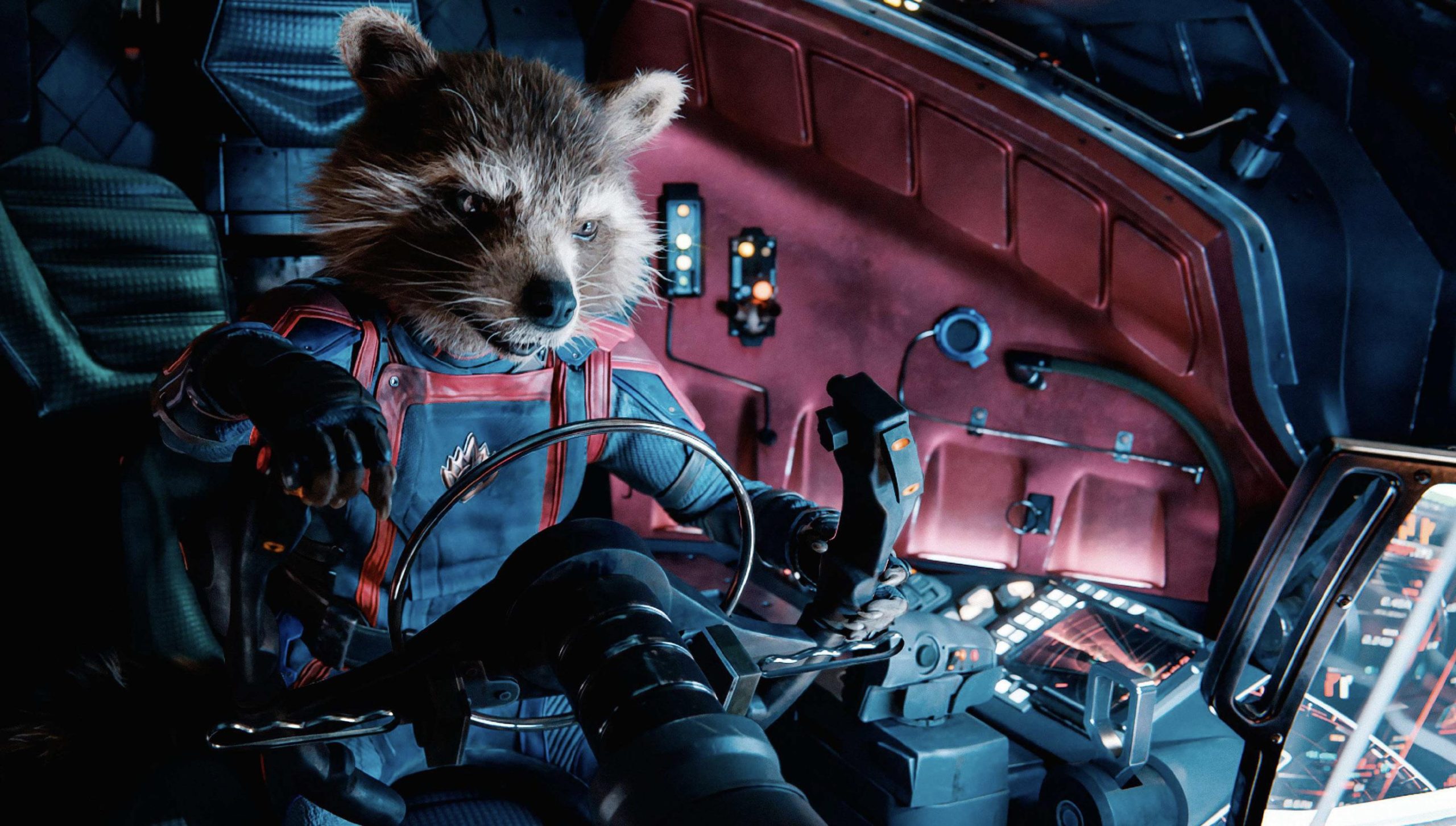
Rocket (voiced by Bradley Cooper) in Marvel Studios’ Guardians of the Galaxy Vol. 3. Photo courtesy of Marvel Studios. © 2023 MARVEL.
However, we learn early on that Rocket Raccoon is The High Conqueror’s white whale. The one that got away. Rocket is one of the Conqueror’s only creations to come even close to meeting his impossible standards. Even then, the Conqueror is repulsed by Rocket’s physicality while remaining in awe of his mind. Through a series of flashbacks we’re given more context about Rocket’s relationship with the Conqueror as the only one of his beings with a superior intellect to his creator. For years, the Conqueror has been preoccupied with finding Rocket and extracting his brain for further experimentation.
If the film does occasionally struggle to establish the stakes and put every piece on the board in its proper place, it’s entirely saved by a second half that ranks among the best work ever produced within the MCU. “Vol. 3” takes ten years of character development and puts it to good use, resulting in one of the few “one last ride” movies that actually feels like one last ride. That Gunn is also able to sneak in some body horror and one of the greatest hallway fight scenes of all time is just a testament to his refusal to settle.
Again, nobody would blame you for just not vibing it with or with Gunn’s unsubtle approach. And maybe, after a certain point, the bar has fallen so low that anything remotely competent can be considered groundbreaking within the framework of the MCU. But Gunn is still spending Marvel’s money better than anyone else and, after seeing how much of the Quantum Realm was just a green screen in Atlanta, it’s nice to see they actually built a couple of sets for this one.
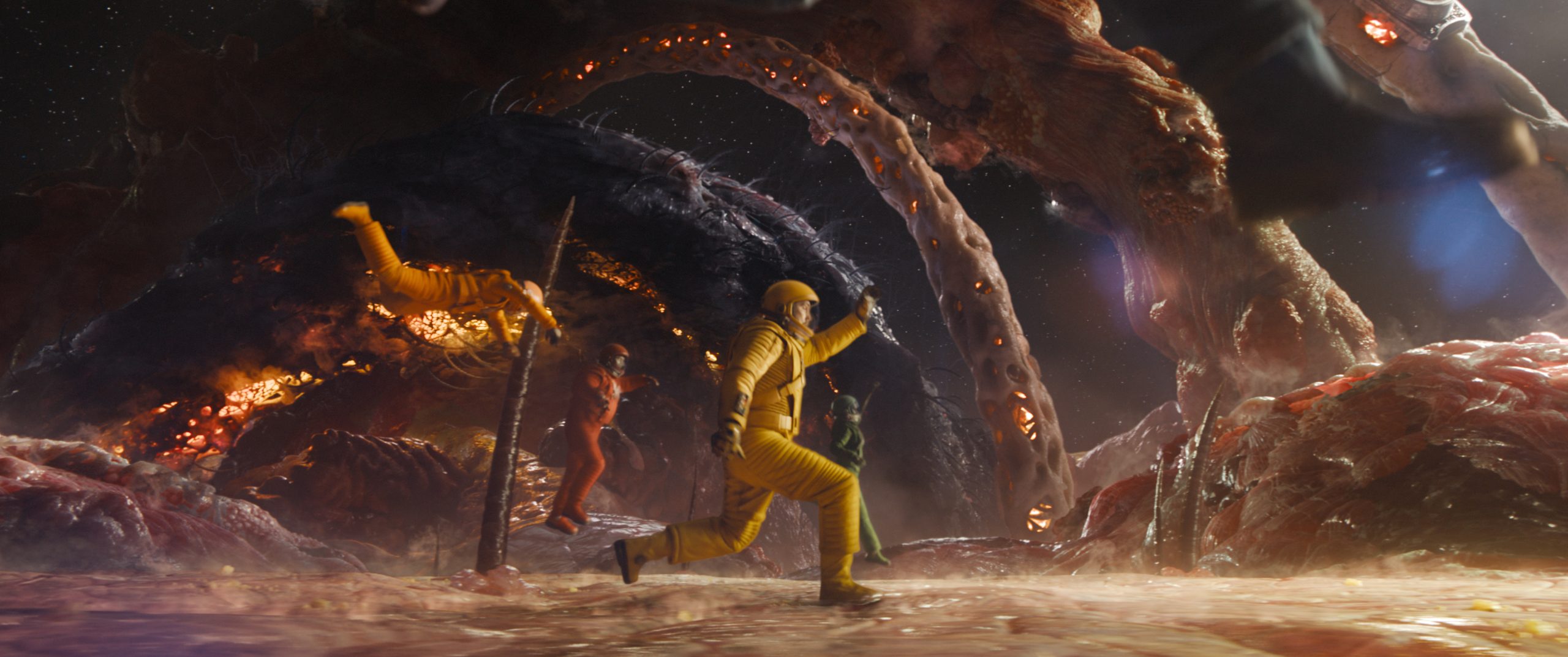
Pom Klementieff as Mantis, Dave Bautista as Drax, and Chris Pratt as Peter Quill/Star-Lord, and Karen Gillan as Nebula in Marvel Studios’ Guardians of the Galaxy Vol. 3. Photo courtesy of Marvel Studios. © 2023 MARVEL.
It’s that added layer of tangibility that allows the actors to look noticeably comfortable with their surroundings. They are looking at things, holding them, touching them, interacting with them. Even if the seemingly effortless chemistry between the group is starting to feel a bit strained, what remains is the believability that they actually inhabit the world Gunn has created. Compared to “Ant-Man and the Wasp: Quantamania,” where the cast appears to talk face to face but rarely look like they’re even in the same room, it’s a refreshing change of pace to see a Marvel flick that doesn’t look like it was created entirely by overworked and underpaid VFX artists working in windowless editing bays.
Speaking of, Gunn’s decision to focus more on Rocket works better than it has any right to thanks to not only Bradley Cooper’s enthusiastic voice acting but some impressively textural CGI. The MCU does have an edge when it comes to rendering certain CGI characters so perfectly it really looks like they’re standing in front of you. But Gunn’s shift in focus also offers a much-needed distraction from Chris Pratt, who seems to have depleted whatever was left in his reserve of charm and subtlety. There are moments where it seems like the film is trying to actively cut around him and he sometimes threatens to completely suck the life out of the room when he appears onscreen. Gunn may not have agreed with it, but having Peter Quill throw a tantrum in “Infinity War” is maybe the most interesting thing he’s done since the last “Guardians” movie. And this “Guardians” movie, for that matter.
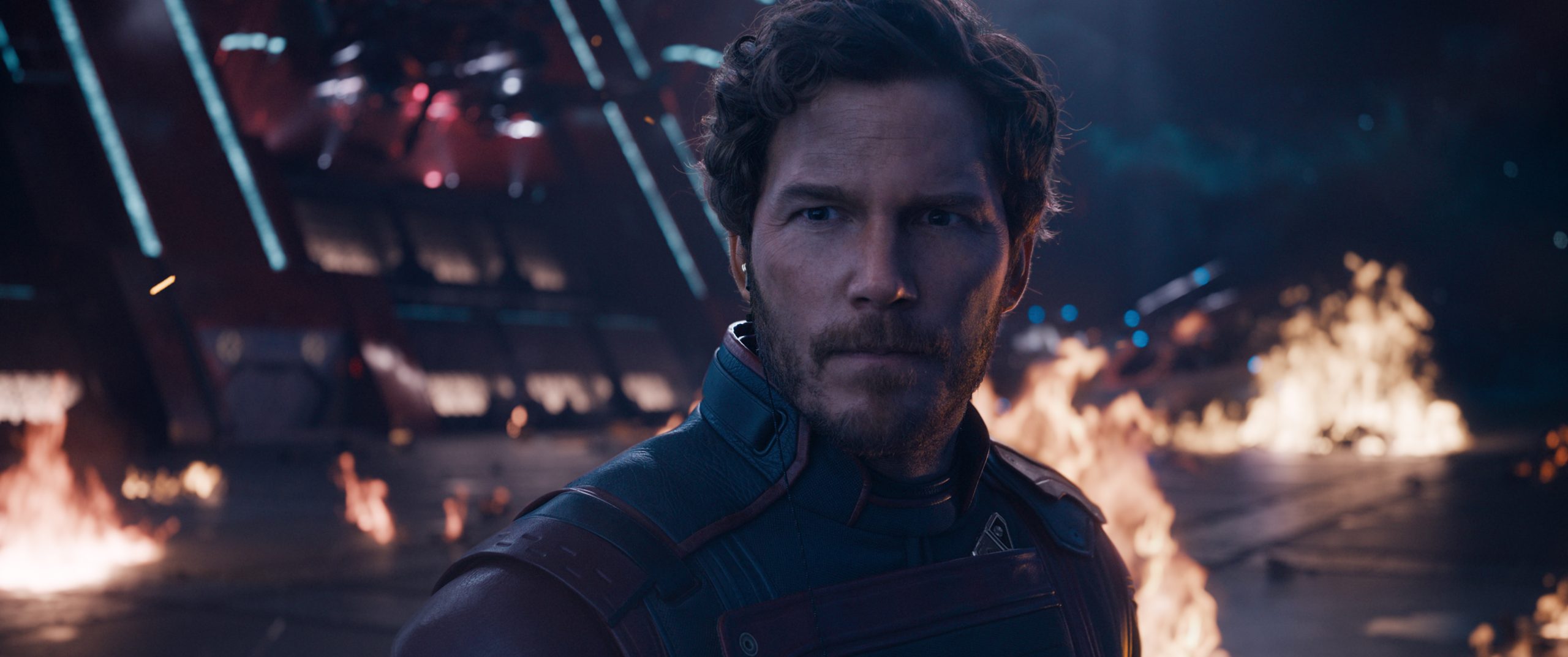
Chris Pratt as Peter Quill/Star-Lord in Marvel Studios’ Guardians of the Galaxy Vol. 3. Photo courtesy of Marvel Studios. © 2022 MARVEL.
It’s not just about Pratt, himself, who has fallen out of favor so intensely with the American public that it’s of genuine concern to me who will hire him after this. The character of Peter Quill has just been passed through so many hands, from “Infinity War” and “Endgame” to “Thor: Love & Thunder,” that he plays like a shell of his former self. In the decade since his introduction, Quill has gone from a charming, petty thief to a self-righteous world saver. Bound just the littlest bit to the powers that be, “Vol. 3” Quill often behaves like he’s made up of two completely disparate personalities: the quick-witted, confident captain that he was and the moralistic, pearl-clutching buzzkill he’s become.
However, Dave Bautista (playing Drax the Destroyer) once again steps up to the plate and confirms that putting him in the vicinity of a small child is scientifically guaranteed to induce a rush of dopamine in your brain. Karen Gillan (playing Nebula), too, is frustratingly good as a character so perfectly rendered it feels like they continue to incorporate her because they genuinely want to instead of as the result of some contract dispute. If there was ever a legitimate argument for any Marvel film to win a major Oscar, she is that argument’s crux. Still, as committed as the entire cast is to these characters — and as teary-eyed as they are about retiring them once and for all — the feeling that they want to move on from this franchise is palpable. Gunn has done what he can with these characters and there’s nothing better than a franchise that knows when to say when.
There are some speed bumps here and there whenever “Vol. 3” displays symptoms of a fatal cinematic ailment known as Marvelitis, as with the clunky introduction of Adam Warlock (Will Poulter). But it’s easier to look past narrative inconsistencies, messy plotting, and unearned emotional beats when so much of it works in ways that nine-figure blockbusters rarely do. It joins the likes of “Star Wars: The Last Jedi” and Raimi’s “Spider-Man 2” as a major tentpole release that dares to tell something that resembles an intimate, human story, especially in a genre that so often substitutes lore for genuine worldbuilding.
Our Grade: B+
Josef Rodriguez is a writer, filmmaker, and film critic living in New York City.
